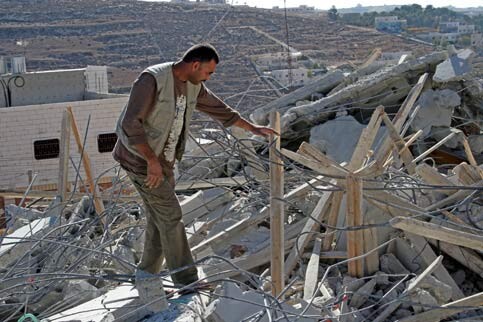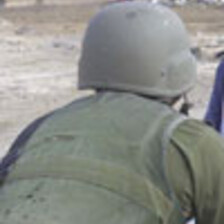The Electronic Intifada 16 December 2006

A Palestinian man walks on the rubble of his house after an Israeli bulldozer demolished it, near the West Bank city of Hebron, November 29, 2006. (MaanImages/Mamoun Wazwaz)
In analyzing Palestinian behavior, analysts often slip into what sociologists call “a person-centered” analysis, which attributes most behavior change to personal pathologies or virtues. But to understand why Palestinians behave as they do, what is necessary is a situation-centered approach, one that focuses on external factors.
This is because the Palestinian situation is as close to a controlled social experiment as anyone is likely to find in the wild. When US social scientists conducted the by-now classic prison experiment to test the power of the social situation to determine behavior, values and attitudes, they were surprised by the results. They discovered just how powerful external factors can be in corrupting the behavior of ordinary people. In that experiment, well-adjusted US college students took on the role of prisoners and guards in a functional simulation of prison conditions.
It is worth quoting the results of the experiment: “Many of the normal, healthy mock prisoners suffered such intense emotional stress reactions that they had to be released in a matter of days; most of the other prisoners acted like zombies totally obeying the demeaning orders of the guards; the distress of the prisoners was caused by their sense of powerlessness induced by the guards who began acting in cruel, dehumanizing and even sadistic ways. The study was terminated prematurely because it was getting out of control in the extent of degrading actions being perpetrated by the guards against the prisoners - all of whom had been normal, healthy, ordinary young college students less than a week before.”
Now imagine a similar experiment conducted on a large scale that goes on for decades. The prisoners start out as normal, ordinary people - Palestinian farmers, villagers, town dwellers. They end up as dehumanized zombies, terrorists and crazed people beating their breasts in agony on TV while standing on the rubble of their destroyed homes on top of the shattered and bleeding bodies of their children. They are subjected to sadistic Israeli practices, they are hosed back into smaller and smaller enclaves and surrounded by concrete walls, their just cause is twisted and bargained away against their will. And then finally, in what psychologists call a “fundamental attribution error”, their natural reaction to their situation becomes the reason why they were imprisoned and dehumanized in the first place.
What’s worse, no one comes to the aid of these prisoners, although the world is watching. The world is watching the terrible images on TV, in video-game installments, but listening to a weird soundtrack that describes how the crazed Palestinians, now predictably turning savagely on one another, have brought all this upon themselves, because they are personally deficient in some crucial way.
The Israeli Orwellian-named “Defense” Forces attack and subject the Palestinian people on a daily basis. They too are behaving predictably in reaction to their external situation - the authority of the Zionist State, which leads them to blindly obey “unjust authority in delivering extreme levels of shock to an innocent victim”. The quote is from yet another classic American psychological experiment that demonstrated how ordinary people are capable of behaving like monsters, simply because an authority figure tells them to do so.
Similarly, the Palestinian President’s paralysis cannot be attributed to Hamlet-like character flaws of indecisiveness and hesitation, but rather to the fact that external factors prevent him from choosing freely. The current Palestinian President is in prison himself, as surely as Arafat had been imprisoned in his compound. He has little discretion to act. His choice is like that which psychologists use with children to give them the illusion of control: “Would you like to sleep with the lights on or with the lights off, honey?” Neither is a choice if the real issue is about whether to stay awake or to sleep and has nothing to do with lights.
The mentality that traces cornered Palestinian behavior to personal pathology (terrorism and evil!) rather than to situational forces also implicitly allows the international community to wash its hands from the situation with a clear conscience.
But the cycle of attack and counterattack must be broken, and it is the responsibility of the international community to break it, simply because the conflict is the creation of the international community in the first place. A cyclical view of history implies that there is no starting point and no end, only patterns. It relies on the power of time to erase memory. The Palestinian situation, however, is linear and has a definite beginning just as it must have a definite end. Let’s start with when the British mandate government in Palestine transferred large areas of confiscated Palestinian land to the Jewish Agency and the Jewish Potach Company in preparation for the creation of the Jewish State of Israel.
Tony Blair, the outgoing British Prime Minister is now belatedly and grandiosely proclaiming that “from now until I leave office I will dedicate myself to advancing peace between Israel and Palestine.” Let him advance peace by starting with ground zero, with Britain’s original sin and with the subsequent partition of Palestine in favor of the Jews, who then owned less than 10% of the land area of the state given to them. Let him work closely with the US, who was then the most aggressive UN proponent of partition, as it is now the most aggressive proponent of the apartheid State of Israel. The people they dispossessed then, the Palestinian refugees and their descendants, are still waiting for some kind of resolution to the injustice perpetrated against them.
Rima Merriman is a Palestinian-American living in Ramallah in the occupied West Bank.
Related Links





